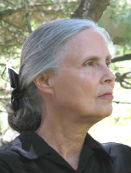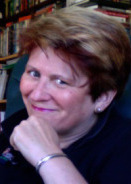Interview on Memoir Writing - Part 7
This is Part 7 of our conversation about memoir writing with Kendra Bonnett and Matilda Butler fromWomensMemoirs.com. Click here to return to Part 1 of the conversation.
In this portion of the conversation, Kendra and Matilda offer advice about revision and editing of a memoir.
A Conversation with Kendra Bonnett and Matilda Butler: Revising the Memoir

Matilda: I think a good point too is that there comes a time in the process of writing where -- of course, you should not have any kind of a censor. You should go ahead and write, but then there does get to be that point, once you have worked yourself through the story of the memoir, when you have to look at it and say you know, this doesn’t belong here. This is what I did -- I would just take my hand, and I would grab up in the air and I would say, I am really sorry but you just don’t make it and I would open the hand over the empty floor. And I would just think of it as my little cutting room. and I had to drop some of that. I had to say good-bye.
Because you never want to say goodbye to your words. You know, as Kendra says, I never met a word I didn’t like. But you have to sharpen your story. You have to have a clear line through your story. You have to think about what your message is and what your theme is. And, when you do that, then you have shaped a story that other people will want to read. But that means that there are some things that you might get really fond of, but they just don’t belong in the end of what you are doing. That’s what these stories were. They were these composite women, and I spent a great deal of time on them. I even had a picture for each of them, and I knew all the facts about them. I mean I had done a lot with them, and then it was an effort to sharpen was really what it was. Because when you have lots of people’s stories, then it is harder to have it as well focused. And this was our way of recreating the times and then the lives as they changed, but it didn’t make it and it didn’t belong there. And I had to grab it up from the air and turn around in my chair and drop it on the floor and say, “I am really sorry.” And I said goodbye to each of them, and that was it.
So everybody has their own little way of doing that. Some people just cross it out, and they are fine. I got kind of involved with these women’s lives, so I had to find my own little way of putting them aside.

Kendra: I think there is some worthwhile advice that could come out of all of this, and that is, if you’re not a writer -- and even if you are one -- it pays to use a professional editor at the end. It really does. Not only do they bring professional skills, but they bring another eye. They’ve seen many books, they’ve helped with many books, so they bring a sense of what the market wants too. They know things that the first-time writer doesn’t know. And these days, with all the cutbacks in the publishing world, as well as the number of people who are going to forms of self-publishing, you may not be offered an editor, so get your own. It’s worth it.
The other thing is, as you are working on your memoir, I think it is worthwhile to work with other people who are working on memoirs and sharing and learning from one another. We do our critique groups, and we find there’s a lot of strength and, in fact, some very enduring relationships that come out of those groups as they’re pouring these stories out. And you get to throw your story out there and discuss it with other people. And sometimes they’ll give you the insight into how to write something that maybe has been troubling you. So I think it is very worthwhile to try and find or put together a group.
Matilda: I think that’s a very good point to bring up here. Also, at the level of Kendra’s point about editing—one of the things that we recommend is that after you have written a piece, whether it’s a scene, a vignette, or a chapter, read it out loud and you will find a lot of your own problems. Even you will say, “Oh, that didn’t make sense,” or not only do you find when you leave out words et cetera, but you will actually hear it and you may find some of your own weaknesses in it when you do that. It is very different than just reading with your eye. If you go into a room where there is no one else and you don’t have to worry and read it out loud, it’ll really help you with your own writing. A simple technique. but it will really help you.
In the next part of our conversation about how to write a memoir, Matilda Butler and Kendra Bonnett talk about the process of writing their collective memoir, Rosie's Daughters: The "First Woman To" Generation Tells its Story, which won an IPPY National Book Award in 2008.
Memoir Writing - Next Steps
Click here to go to Part 8 of our conversation about memoir writing with Matilda Butler and Kendra Bonnett.
Check out our memoir writing competition. Read the memoirs submitted by other visiters and publish your own!
Get memoir writing ideas on this writing prompts page.
Read our interview with Heather Sellers about memoir writing.
See a list of all memoir writing topics.
<< BACK from Memoir Writing to Creative Writing Now Home